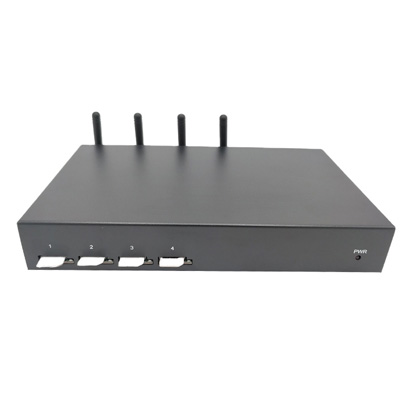What is a VoIP gateway? At its core, a VoIP gateway serves as a bridge between traditional telephony systems and modern Voice over Internet Protocol (VoIP) networks, facilitating the seamless transmission of voice signals between analog or digital phone lines and IP-based networks.
Origins and Evolution
The concept of VoIP gateways emerged alongside the widespread adoption of VoIP technology in the telecommunications industry. As businesses and consumers transitioned from legacy copper-wire networks to IP-based communication solutions, the need arose for interoperability between disparate systems. VoIP gateways filled this gap by converting analog voice signals from traditional telephony networks into digital data packets suitable for transmission over the internet.

Functionality and Integration
VoIP gateways come in various forms, ranging from standalone hardware devices to software-based solutions integrated into VoIP platforms. Regardless of their form factor, all VoIP gateways perform essential functions such as signal conversion, protocol translation, and call routing. By supporting multiple protocols and codecs, VoIP gateways enable seamless communication between different types of networks and devices, including analog phones, digital PBX systems, and SIP-based VoIP endpoints.
Significance and Impact
The significance of VoIP gateways lies in their ability to facilitate the migration to VoIP technology while preserving investments in existing telephony infrastructure. For businesses seeking to modernize their communication systems without incurring the cost and complexity of a complete overhaul, VoIP gateways offer a cost-effective and scalable solution. Additionally, VoIP gateways play a crucial role in enabling connectivity in remote or underserved areas where traditional telephony infrastructure may be limited or nonexistent.
Challenges and Future Trends
Despite their advantages, VoIP gateways face challenges such as interoperability issues, security concerns, and regulatory compliance requirements. Moreover, as VoIP technology continues to evolve, the role of VoIP gateways may undergo changes, with greater emphasis on software-defined networking (SDN) and cloud-based solutions. Additionally, emerging trends such as the Internet of Things (IoT) and 5G connectivity are poised to influence the evolution of VoIP gateways, driving innovations in areas such as voice recognition, artificial intelligence, and unified communications.
Conclusion
In conclusion, VoIP gateways represent a vital component of modern telecommunications infrastructure, facilitating the seamless integration of legacy and next-generation communication technologies. As businesses and consumers embrace the benefits of VoIP technology, the importance of VoIP gateways in enabling connectivity and interoperability cannot be overstated. By understanding the functionality, significance, and challenges associated with VoIP gateways, stakeholders can make informed decisions when planning, deploying, and managing their communication networks.
None
None

Comments
0